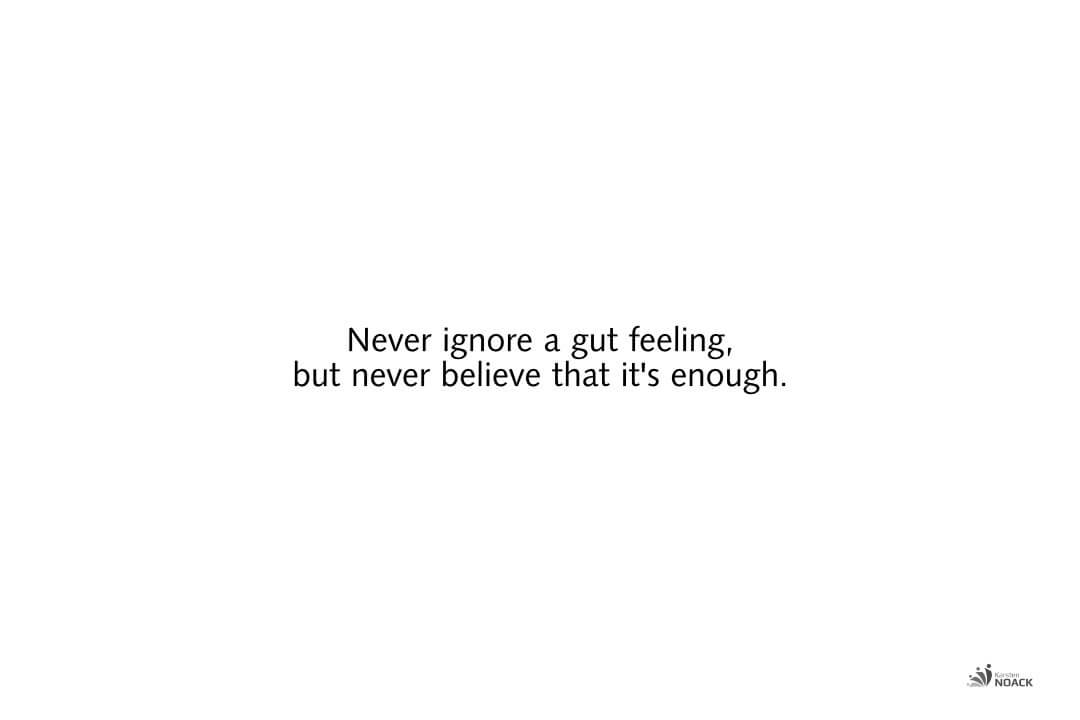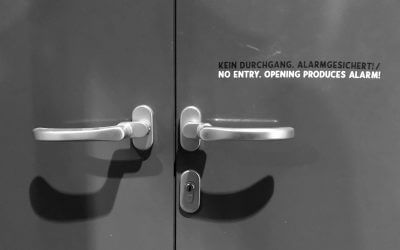Are Gut Feelings Short Cuts to Better Decision-Making?
Do you trust your experiences? How about your gut feeling?
Are gut feelings shortcuts to better decision-making?
More and more evidence is being discovered that many of our most important decisions, such as which partner to marry, how to invest money, and so on, are not made by rational consciousness, but by the subconscious, also referred to as gut feeling. Can you trust your gut feeling?
Overview
There is more reason in your body than in your best wisdom.
Friedrich Nietzsche, Thus spoke Zarathustra
Gut feeling
We possess the capacity to feel, and thereby the ability to know things without consciously reasoning. The gut feeling is real, and we use it all the time. A gut feeling arises when your brain makes an instant connection between what’s happening in the present and a similar circumstance from your past.
There is no such thing as a purely logical decision. The brain uses a combination of logic and emotion when making decisions of any kind. That specific emotion, innate to us as humans, is called intuition. Intuition is about how quickly you can tap into your subconscious mind, where you archive all types of information that you don’t remember on a conscious level. This intuitive system is more hardwired into the human species than commonly understood. It is the automatic, mindless thought process that doesn’t require analysis or deep thinking.
Is it magic?
This kind of intuition isn’t magic; it’s unconscious reasoning. Our brains record all experiences; every meeting, client interaction, presentation, and personal decision. With every experience, the cache of information our brains have at their disposal grows. In general, any experience is a good experience, and the more we have of them, the more accurate our gut feelings become.
What your hunches tell you is often a better gauge of what will make you happy than an analytical spreadsheet could ever be.
On the other hand, always trusting your gut can get you into a lot of trouble. Sometimes it’s capable of screwing you over by causing you to believe you’re right when pretty much everyone else can see that you’re wrong.
Use your gut feeling as an indicator
Your gut feeling is way more than just a feeling. But it is clever to listen to it?
Gut or logical brain? It depends on the topic and the possible consequences. There is no such thing as a purely rational decision. The brain uses a combination of logic and emotion when making decisions of any kind. Use the news. I suggest that we listen to our gut feeling and use it as an indicator, but not a sole decision-maker.
Explore more than one perspective
Sound business decisions are based on facts, data analysis, trend spotting, or other complex calculations, and yes – a bit of intuition. But your instinct should be used as an indicator, not the basis for your decisions. In every business, there are variables and unique scenarios that make planning and analysis imperative; neglecting these factors could have serious implications.
Coaching for decisions
Decisions have to be made over and over again - small and large. Some are easy, some are difficult. We make many of these decisions without having to think much about them or even completely unconsciously, automatically. But now and then we come to the point where we encounter a decision where we pause, don't know what to do, don't see clearly. Often these are decisions of great importance that also have the ability to question important aspects of life that were previously considered given or untouchable. Such a situation can create pressure and even lead to paralysis, so that creative and constructive ways remain unconsidered.
Who sees clearly, can decide better and act purposefully. In order for this to succeed, it is necessary to ensure that the options are identified and, if necessary, increased and priorities clarified. Decision coaching helps to oversee the forest for the trees and to find the right focus. The best decision and creativity techniques can be used most effectively in a good mental state.
In order to make your decision easier, to be supported by me, I focus on transparency. On these pages you will find information about me (Karsten Noack) and the fees.
Just ask me personally
Please post any questions that may be of interest to other readers in the comments. Looking for professional help?
If you are interested in coaching, training or consulting, if you have organizational questions, or if you want to make an appointment, you can reach me best via this contact form (you can choose whether you want to enter your personal data) or via e-mail (mail@karstennoack.com). The privacy policy can be found here.
Transparency is important. That is why you will find answers to frequently asked questions already here, for example about me (profile), the services, the fees and getting to know me. If you like what you see, I look forward to working with you.
Remarks:
In the address bar of your browser, the URL should begin with "https://www.karstennoack.com/...". This indicates a secure connection (SSL). Whether you enter your real name is up to you.
2 Comments
Submit a Comment

Don’t ignore conflicts!
When problem-solving everyday issues become a tug-of-war over who’s right and who’s wrong, then settling even the smallest of discussions becomes a battle. Don’t ignore conflicts. Deal with them!
Beware of manipulation: Intentional mirroring in conversations
Intentional mirroring is the deliberate imitation of other people to make them feel good. It serves to promote rapport and can also be used against the interests of the mirrored.
15 tips on how to stand up for your conviction: Be brave, speak up!
Some people have an opinion that deserves attention. Often, however, this opinion is not heard. Then it is time to decide whether to keep it that way or to share the point of view more clearly with others. Not everyone dares this step. What about you?
Recognize the 11 most common manipulation techniques
Learn how to recognize manipulation and choose counter-strategies. Here are descriptions of eleven types of manipulation techniques including body language.
Here and now
Be aware of the side effects of planning. We could miss being in the moment right now.
One side of character is integrity
Integrity is an important part of a character. Integrity is a choice we make, and it’s a choice we must keep making, every moment of our lives. Develop and protect your integrity.
Are impatience and laziness cardinal sins?
Do you think that impatience and laziness are sins? Or do you see the good intent?
Promises and integrity: Who cares about the promises of yesterday?
Actions that follow words? Authenticity? Walk your talk? In a world in which we are not accustomed to doing that, this is quite remarkable.
More contentment through self-acceptance or does that reduce the motivation?
Many people consider discontentment to be the most important motivator. My observation: We are happier when we learn to accept ourselves as we truly are. And we stimulate personal development this way.
Good fear, bad fear
What are fears and anxiety good for and how to let go of limiting fears?
The strength of character and how to cultivate it. 20 factors
Do you stand up for yourself and your concerns, are you true to your values even when there is a headwind? This article is about 20 elements of character strength and how to cultivate them.
Opinion making needs reliable information
Instead of blindly adopting opinions, it is worth investing in your own opinions. But where does the information come from?
This article is a short excerpt from the more comprehensive course materials my clients receive in a group or individual training or coaching.
Published: March 8, 2005
Author: Karsten Noack
Revision: August 20th, 2023
Translation: ./.
German version:
K:
H:
T: RR
#134












How can I separate fear or intuition?
To separate limiting fear from helpful intuition, it is good to know yourself.
This is a lifelong challenge.